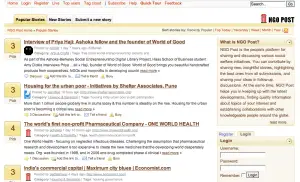Few steps to a powerful social software application
I have been dealing with different kinds of content management systems for some years now. What I find fascinating lately it is how applications became powerful and how easy they are to handle by non-experts. **Through these applications, creating social media and networking is possible for everybody. **Wikis and blogs can be set up in minutes through different web services. But also social network software such as Drupal, advanced content management systems such as Joomla, and of course, blog software such as Wordpress, can be easily installed with little effort. For less then 10 bucks and with little web knowledge, powerful applications are around the corner.
- Pick a hosting package which offers these free and open source software and includes one click installation for applications.
- Most of these providers offer you a web based administration interface, where you can choose from many different software. With a few clicks a software is installed.
- The application can be controlled through another web based interface and can be manually configured to different needs. For example, Wordpress can be combined with blog posts and static pages to have a blog and a normal homepage.
- Hundreds of free websites' templates are offered for all sorts of different taste. In Joomla, it can be easily uploaded on the website itself and you can jump between different designs.
- Hundreds of different modules or plug-ins allow you to extend your website in all directions. These modules are mostly for free and only need to be uploaded via ftp and activated in the web based configuration.
Of course these steps are a bit simplified, and to have a successful website running, still expertise is needed. However, with already included multiple language packages, these free and open source applications set the path for great networks to social change everywhere. Rightly done, these websites surely can compete with big portals in terms of their features and social networking features. Some applications offer even other distinct services such as BuzzMonitor and Pligg:
BuzzMonitor is "an open source application that "listens" to what people are saying about the World Bank across blogs and other sites in order to help the organization understand and engage in social media." It is developed by Development Seed, who are also making a presentation at the web2fordev conference and Pierre Wielezynski from the World Bank. It is a monitoring that includes all kinds of feeds and allows them to be rated by the members. This is excellent for a community or organisation to get a picture of certain topics. It can be tested here: buzzm.worldbank.org/tour
 A truly amazing application is Pligg, which is a Digg like software. It is a good approach for bringing people together to share and rate news from the web. It is, for example, used for social development here: ngopost.org. With this tool a community share and discuss what is happening in the info-sphere of the web. I would really like to use that application, however, I imagine it is not easy to involve others to join, when everybody is already involved in so many on-line networks. Does somebody have an idea?
A truly amazing application is Pligg, which is a Digg like software. It is a good approach for bringing people together to share and rate news from the web. It is, for example, used for social development here: ngopost.org. With this tool a community share and discuss what is happening in the info-sphere of the web. I would really like to use that application, however, I imagine it is not easy to involve others to join, when everybody is already involved in so many on-line networks. Does somebody have an idea?
In conclusion, I think the development of free and open source social software is decisive to engage for social change and development through web2.0. It will allow to spread the social media thrive in all areas. It is the openness of this application that let us communicate, sharing and creating social media in new ways.